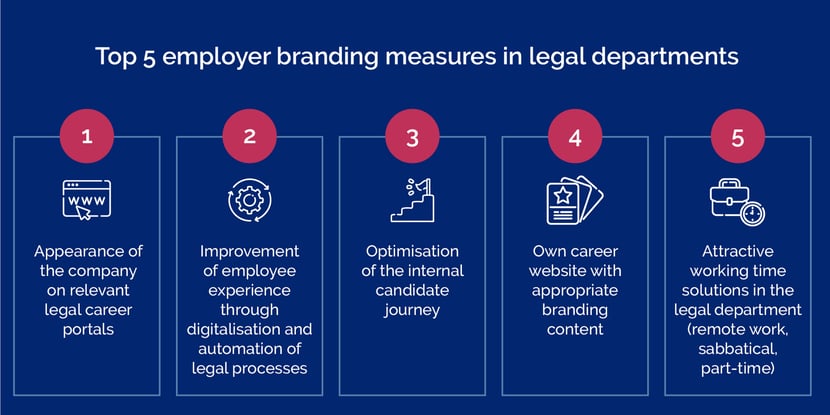How easy is it for you to fill vacancies in your legal department? Maybe it's time to review your recruiting strategy! We’ll show you how your employer branding plays a role in this and how legal tech can help spruce it up.
Why is Legal Recruiting important?
4 months – that's how long it takes, on average, to fill a position in the legal environment, according to an LTO survey. What does this number tell us? For one, that the applicant market is tight and there are nowhere near enough qualified lawyers to cover the demand. The so-called "war for talents" is in full force.
But that is no reason to be discouraged, because this 4-month timeframe is also a generalisation. By no means does every law firm and company suffer equally from a lack of staff: 40% of the employers in the LTO survey manage to fill legal positions in 3 months at most. For 20%, on the other hand, it takes 5 months or longer.
These differences show that companies do have significant wiggle room in the legal recruiting process and aren’t just subject to the current state of the market. This is good news, as the success of your legal recruiting is both a critical driver of your company's performance and a limiting factor for growth.
What is Legal Recruiting?
Let's start with the definition of legal recruiting. Legal recruiting describes the art and skill of finding and contracting suitable candidates for open positions in the legal field. To do this, companies can use direct recruiting channels (such as a job advertisement) or indirect recruiting channels (such as a recruitment agency).
What sounds so simple actually involves many levels of action and requires differentiated processes from the company or law firm’s side. A job ad on the website today and 30 applications in the mailbox tomorrow? That's rarely how it works.
This is what legal recruiting means in reality:
- Legal recruiting requires companies to invest a lot of time and money.
- Legal recruiting is a process that begins long before the job is advertised and does not end even after the position has been successfully filled – status "ongoing".
- Legal recruiting involves the development of a pool of strong candidates, market analyses and the cultivation of in-depth relationships (networking). You also need an integral personnel strategy that is not only externally focused on new talent, but also internally focused on existing employees.
In short, legal recruiting involves the challenging skill of attracting, developing and retaining talent for the legal department. But why does this seem to be a problem for many companies, and law firms in particular?
Why is Legal Recruiting so challenging?
Legal recruiting is a big challenge for many employers today. 3 factors play a role here:
- Lack of candidates: there are fewer and fewer candidates for more and more vacant positions – a classic candidate market. This situation is exacerbated by the high, often justified, demands of employers. Law requires excellence in many areas. For this reason, applicants below a certain grade point average (or without a double VB, experience abroad or further qualifications) are dropped from the search radar from the get go.
- Applicants have high expectations: companies aren’t the only ones who know exactly what they want. Candidates themselves are also scrutinising potential employers. What is becoming increasingly decisive for applicants is a modern, digital working environment with automated processes.
- Lack of visibility even if the mutual demands are balanced, many companies find it difficult to attract young legal talent. The reason: they are simply not perceived as potential or attractive employers. Their HR marketing and recruiting channels lack reach. Or they have not done their homework in the area of employer branding.
How can Employer Branding help with Legal Recruiting?
Speaking of employer branding – this aspect is particularly important when it comes to recruitment and thus deserves attention. The time it takes to fill a position is often inversely proportional to the strength of employer branding.
This is proven by the LTO survey: those law firms that took longer than average to fill a vacancy rated their employer branding as rather weak. Those employers who filled positions quickly, however, considered their employer branding to be rather strong.
In summary: employer branding pays off, because it has the potential to reduce the time and money previously required for legal recruiting.
Employer branding is about building a strong employer brand and using it profitably in legal recruiting. This works for the following reasons:
- You combine all of your individual measures, values and benefits under a tangible "corporate brand". This operates on an emotional rather than a cognitive level and is more easily and permanently memorised.
- Employer branding positions the company as an attractive employer. This not only has an external effect, but works on the internal level too, in the form of strengthened loyalty among existing employees.
- Unlike a quickly typed job advertisement, employer branding is strategically aimed at analyses. These include the initial context, target group and future image of the company. This is why employer branding has a lasting effect.
Top 5 Employer Branding measures in Legal Departments
- Appearance of the company on relevant legal career portals
- Improvement of employee experience through digitalisation and automation of legal processes
- Optimisation of the internal candidate journey
- Own career website with appropriate branding content
- Attractive working time solutions in the legal department (remote work, sabbatical, part-time)
 How do digital Applications in the Legal Department help attract Talent?
How do digital Applications in the Legal Department help attract Talent?
Part of employer branding is employee experience. This buzzword describes the concrete experience that employees have in your company and how they feel when interacting with it. Here, too, we are talking more about emotional motivations, which may be difficult to grasp, but have all the more impact. Nevertheless, there are very concrete measures that have been proven to improve employee experience.
The most important measure is the introduction of digital, intuitive and automated self-service processes in the legal department.
Self-service processes…
- are processes that a person can initiate and control to a high degree,
- are often supported by AI-based digital applications
- involve as few media breaks and waiting times as possible,
- are automated to the extent that they run by themselves.
If the legal department uses digital applications such as automated contract review by Legartis, this has an attractive effect on potential candidates. They are a decisive criterion for many candidates for two reasons:
- They signpost an attractive company with future potential: digital applications in the legal department indicate that a company is willing to move with the times. Candidates want innovative, modern employers, preferring them to their rigid, outdated and traditionalist counterparts.
- They offer the personal benefits of a modern work environment: digital workflows make work efficient and pleasant. No applicant wants to be slowed down by time-consuming analogue processes and long approval loops. Therefore, your target group is looking for companies that enable digital, self-effective work.
Legal Recruiting: 3 Key Takeaways
- Even if the situation in the applicant market is tight, with the right measures companies can help prevent staff shortages in the legal department.
- Employer branding in particular pays off, as it reduces the effort and costs you need to invest in your legal recruiting.
- Promising talents pay particular attention to a modern, digital working environment that promises positive employee experience. Therefore, digital applications such as those from Legartis help to fill vacant positions with suitable candidates.
Recommended Articles
Intelligent Contract Solutions: Use Cases, Capabilities, and How to Choose (2026)
Intelligent contract solutions are systems that turn contracts from static documents into operational decision logic—by extracting meaning from contract language, applying..
Agentic Legal AI: The dormakaba Group Case Study
Legal departments are facing a paradigm shift. While artificial intelligence in legal work has long been limited to assistance functions—summarizing texts, searching for..
Contract Intelligence: Decide Faster, With Confidence
What is Contract Intelligence? Contract Intelligence refers to the ability to transform legal expertise from contracts into structured decision logic and make it directly..



